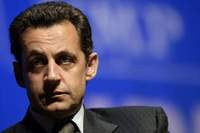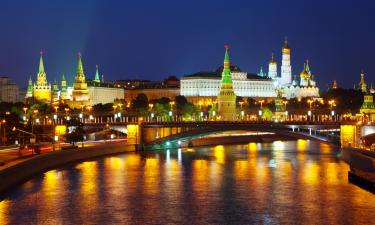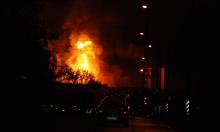Russia gets really nervous about outcome of presidential election in France
The result of new presidential elections in France will definitely change the political atmosphere in the country. Relations with Russia may radically change as well. Both candidates who have entered the second round of the election were born during the cold war, and the confrontation with Moscow that lasted so many years certainly influenced their ideology. Both have already criticized the Kremlin’s line.

The first round of the presidential elections is France is over. Despite the intrigue about the elections, the winners turned out to be quite predictable – right-wing conservative, former Interior Minister Nicolas Sarkozy and Socialist Party candidate Segolene Royal.
It became clear on Monday that Nicolas Sarkozy, the leader of the Union for a Popular Movement (UPM) has won 31.11 percent votes and enters the second round of the presidential elections together with Socialist Party candidate Segolene Royal who has won the support of 25.84 percent of voters. The leader of the centrist Union of French Democrats (UDF) Francois Bayrou got 18.55 percent and ultra-nationalist Jean-Marie Le Pen – 10.51 percent. Other candidates won not more than five percent of votes.
Opinion polls reveal that people see Sarkozy as the winner of the second round of the election with 54 percent. But the result of the elections cannot be considered as decided so far. Leaders of the leftist parties in the National Assembly, the communists and environmentalists, urge to support the candidature of Royal. Francois Bayrou is not quite definite which of the two candidates to support. Le Pen, who was expected to support Sarkozy said that his candidature was bad for presidency as the former foreign minister was not a genuine French.
The economic sphere was the scene of most ardent debates of the candidates for presidency. Sarkozy, who earned reputation by suppression of massacres on the Arab and Negro territories, promised reduction in taxes and curtail of the unemployment relief. Socialist Royal emphasized the importance of fighting with oligarchs and social protection of the indigent. Le Pen’s election campaign was focused on immigrants who flooded suburbs of big cities of the country. Bayrou positioned himself as the third power and anti-globalist, the advocate of French farmers oppressed equally by the right-wing forces and leftists.
At the same time, France’s foreign policy was the key issue of the pre-election debates. Sarkozy declared that he aimed at improving the relations with Washington and even visited the American capital during his campaign. Unlike Sarkozy, Royal strictly criticized Bush’s foreign policy and said he main goal was to consolidate the European Union. Le Pen stated it was necessary to protect ‘the aboriginal Europe’ from the heavy inflow of immigrants; the candidate also voiced his protests against consolidation of the European Commission. Bayrou in his turn voiced no plans as concerning the foreign policy and was rather concentrated on the home policy.
The relations with Russia were certainly not a priority issue for the French electorate; however the basic candidates for presidency touched upon it. “The evolution of Russia makes me uneasy,” says Sarkozy. He says that the Russian policy in Chechnya makes him prefer the USA to Russia. Royal in her turn states that France must speak the language of truth with Russia. It was only Le Pen who turned out to be well-disposed toward Russia. He said he saw Europe stretching from France’s Brest to Russia’s Vladivostok.
Judging by the above statements of the candidates who have entered the second round of the presidential election, the relations between Russia and France will grow worse at least at first.
Let us suppose that Segolene Royal wins the elections, and left-wing forces will be the ruling power. It was always a moreserious problemfor Moscow to establish relations with France’s leftists than with the right-wing forces. Contacts with the right-wing presidents Charles de Gaulle and Jack Chirac were easier for the Soviet Union and then for Russia than relations with the Socialist President Francois Mitterrand.
However, the presidency of Nicolas Sarkozy may bring even more problems. Unlike Royal who openly criticizes US’s policy, the former interior minister of France is open for closer cooperation with Washington, the line that neither de Gaulle nor Chirac have followed before. Sarkozy did not support the US campaign in Iraq openly, but he said that democracy united France and the USA, and so he rather preferred Washington to Moscow.
The Hungarian origin of Nicolas Sarkozy seems to be a real obstacle to the development of relations between Russia and France as East-European problems may interfere here.
No matter who of the two candidates wins the presidential election, the personality of any of them is going to be a historical figure. Sarkozy is not a genuine Frenchman. His father came to France from Hungary and got the French citizenship in 1980. The father of Sarkozy’s mother was a Greek. As for Segolene Royal, she may be the first-ever woman president of France if wins the race. So, in any case a new president of France is going to be a type of president not typical of France.
The choice of the two candidates for presidency in France seems to be rather revolutionary. The president of France Chirac whose term is over supported the candidature of Sarkozy in spite of the fact that years ago the today’s candidate for presidency scandalously divorced Chirac’s daughter and married some other woman. Segolene Royal claims herself to be a modern emancipated woman. Together with Social Party Secretary General Francois Hollande she has four children, but the couple has not yet officially registered marriage over the thirty years of living together. So, Segolene Royal is officially an unwed mother having many children.
These elections are to bring another significant change to the French politics: alternation of generations. Acting President Chirac is 74, and both of his possible successors are slightly over 50. So, France will for the first time in history get a president who was born after WWII. Neither Sarkozy nor Royal witnessed the alliance formed between France and Moscow for fighting Nazism. But the political views of both were formed under the influence of the cold war which implies that their attitude to Moscow may be negative.
A new president who is to come will have rather serious problems to solve during a presidential term. Hundreds of thousands of the French have to work abroad in Switzerland, Belgium and Canada because of the high taxes at home. Much is to be done for regulation of the labor legislation. Arab and African immigrants that are flooding France are getting a more burning problem every year. The problem of the Corsican separatists is not settled yet. Aboriginal minorities – Alsatians, Basques and Bretons – demand official recognition of their national and linguistic rights. They say that Paris must stop converting them into Frenchmen.
As for France’s foreign policy the country is to take a really crucial decision: either to establish closer relations with the USA or resist ‘the Anglo-Saxon world order’. France is to decide either to keep teaching Russia some good sense and build more visa barriers for Russians, or to see Russia as a partner equal in rights and ease the visa regime for Russian tourists. Will France extend the European integration and EU expansion or enjoy the results achieved? We will learn the answers from a new president of France soon after the name of the president is made public May 6 in the evening.
Vadim Trukhachev
Pravda.ru
Translated by Maria Gousseva
Subscribe to Pravda.Ru Telegram channel, Facebook, RSS!





